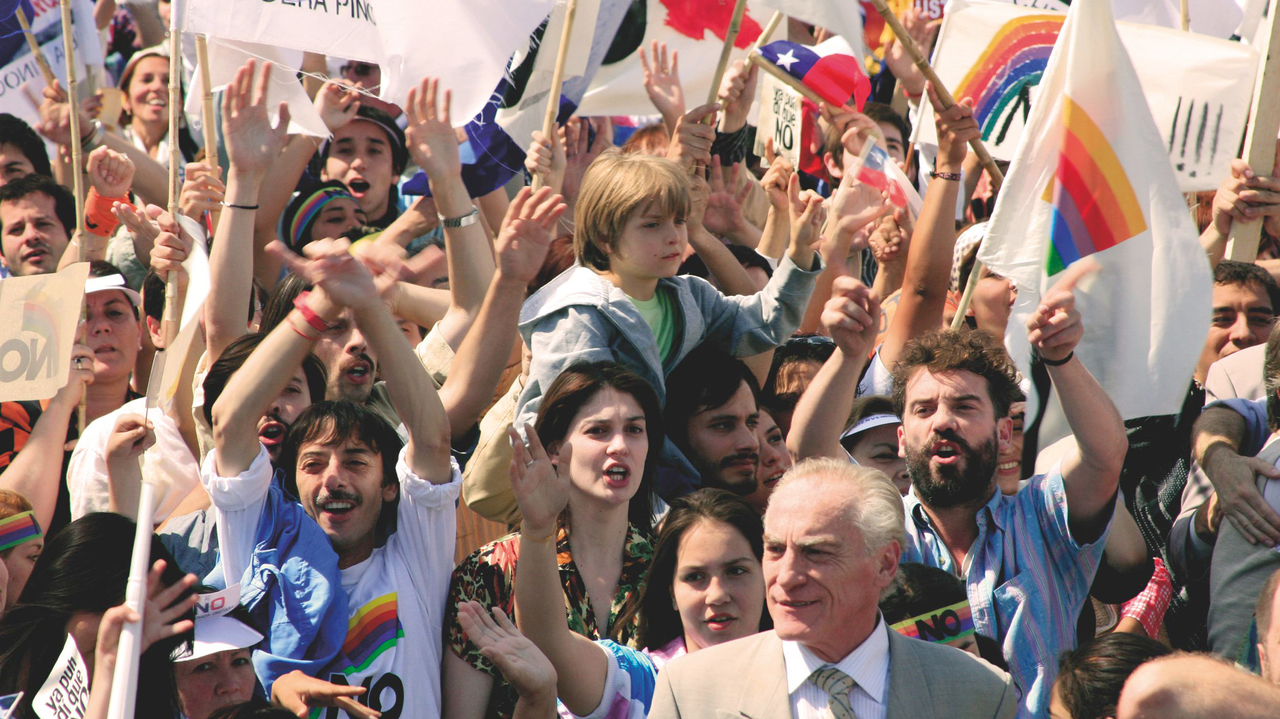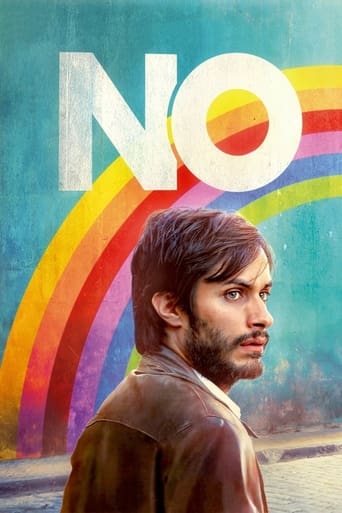

Too many fans seem to be blown away
... View MoreToo much about the plot just didn't add up, the writing was bad, some of the scenes were cringey and awkward,
... View MoreClever, believable, and super fun to watch. It totally has replay value.
... View MoreStrong acting helps the film overcome an uncertain premise and create characters that hold our attention absolutely.
... View MoreIn 1988, fifteen years into his reign as President of Chile, General Augusto Pinochet agreed to allow the people of his nation to hold a national referendum, leaving it up to them to determine whether or not they wanted him to remain as their leader for another eight years. On the surface, this might have seemed like a turn toward democracy for a man who came to power as a result of a military coup and who ruled his nation with an iron fist - sending many dissidents to prison and to their deaths - but many who were opposed to him eyed the elections with a great deal of skepticism and distrust, believing that the vote would be rigged and that his preordained victory would only further strengthen his grip on power and, simultaneously, enhance his image in the eyes of the world.But hold the election the nation did, and it is against this backdrop that the movie "No" is set. Gael Garcia Bernal stars as Rene Saavedra, a divorced advertising executive who lives a profitable and comfortable life with his young son, Simon. Hitherto, he has remained largely apolitical in a country where to voice an opinion on the government or its leaders can put one's own life and freedom in jeopardy (his ex is herself a leftist activist who often finds herself abused and imprisoned for her actions). But when the plebiscite is announced, Rene, somewhat hesitantly at first, agrees to work for the No Campaign, bringing his expertise on advertising for the first time into the realm of politics.While most of the people involved in the campaign want to take this opportunity to expose the horrors of the regime through a hard-hitting series of 15-minute ads, Rene argues instead for a more upbeat, feel-good approach on the theory that people are more likely to respond positively to something that makes them feel happy than something that makes them feel outraged or depressed. The result is a series of TV spots so impossibly bland and innocuous - filled with deliriously happy performers dancing and singing a jingle - that they might as well be selling toothpaste. And I guess that's one of the points of "No" - that in a consumer-conscious society even freedom and democracy eventually become commodities like everything else and can be sold as such.Written by Pedro Peirano and directed by Pablo Larrain, "No" is of more interest as a historical and social document than as a drama, since its characters remain largely superficial throughout. And while the narrative earns points for resisting the temptation to overdramatize an already highly volatile situation, the perhaps inevitable price of that restraint is a picture that actually feels UNDER-dramatized at times. However, the bravery of these individuals in the face of some obvious attempts at intimidation does shine through. In order to more seamlessly blend the action of the story with actual archival footage from the era in which it's set, the movie has been given a deliberately grainy, over-lit appearance by cinematographer Sergio Armstrong that helps to heighten its authenticity.Not quite as emotionally powerful as one might wish it to be, "No" is, nevertheless, a true-life tale of a national uprising well worth paying heed to.
... View MoreThis is the essence of cinema. The story is really involving and the director uses the best tools to show it in a theater.What is more, at the beginning I was thinking this movie is naive, but the last two scenes makes it something even similar to Orwell books.It is also really important because at the general stage it a movie about the reasons which drives people to do something. We usually think that some easy slogans like "freedom" are the ones we should fight for. But this movie shows they are only slogans... Great movie to discuss. Makes you think about the mechanisms of getting power.
... View More¨Adios, Mr. Pinochet¨No is one of those films which I wasn't looking forward to seeing because I just wasn't interested in the subject matter. I'm not into historical political movies, but this film was much more than that. No works more as a media satire than an actual political movie. The satire works really well and it reminds us of how important the media can be in our society. No should be required viewing for all advertising students in schools around the globe. The film works in great part thanks to Gael Garcia Bernal's performance as the ad executive who comes up with the campaign for No in the referendum. Bernal has proved in the past that he's a very reliable actor, and one of the best in Latin America. The film also has great direction from Pablo Larraín, who decided to shoot the film using U-matic video tape to give it a more 80's vibe since that was the type of video which was used then. That brought a sense of realism to the movie, and at times it felt like a documentary. This was a well crafted film, and a decent contender for best foreign film of the year. It lost to Amour in the Oscars, but received a lot of love in the Cannes Festival last year. The screenplay was very well adapted by Pedro Peirano (who also wrote the screenplay for 2009's The Maid, a well received Chilean film) from Antonio Skarmeta's (famous for his novel Il Postino) play. This is one art house film you won't regret watching.It's the end of the 80's and Chilean dictator, Augusto Pinochet, has called for a national referendum after being pressured by international organisms. After 15 years of dictatorship, Pinochet is allowing the country to vote Yes or No to him extending his rule for 8 more years in the country. Everyone is convinced that this is all a farce and just a means for Pinochet to legalize his authority. Pinochet is also convinced he will win the elections considering that he has brought economic stability to the country. For 27 days both parties will be allowed to have a 15 minute spot of uninterrupted television air time in which they can campaign. This is where the young ad executive known as Rene Saavedra (Gael Garcia Bernal) comes to play. The No coalition decides to hire him to lead their campaign, but what they don't realize is that he will bring a unique approach to the campaign. Since Pinochet's dictatorship was known for its brutal intimidation and censorship, everyone in the No coalition expects to make their voice heard and focus on the violence and brutality of his government, but Saavedra has a different view: He wants to make a joyful, colorful, and upbeat campaign where the primary message is that ¨Chile: happiness is coming.¨ Everyone in the campaign is upset about this, including Saavedra's ex wife, Veronika (Antonia Zegers), who thinks all this is just a waste of time. However, the campaign begins resonating with voters, and Pinochet's people decide to hire Saavedra's boss, Lucho Guzman (Alfredo Castro), to counteract the comedic and joyful campaign. Things won't be easy for the No coalition because the government begins intimidating and pressuring them through violence, but Saavedra knows that his campaign can change the course of the country for the better. Advertising is a powerful weapon in today's world, and more than ever we see governments trying to control and censor the media. The reason being that they know that it can shift elections and bring down tyrannical leaders. That is why more than ever, we must fight to keep governments from trying to control or censor the media. What a lot of politics have done is use advertising wisely to get elected. The film is a great case study on politics and media and how they are correlated. No is a film everyone involved in media and politics should see because it shows the advantages and disadvantages that this medium has. Pablo Larrain has directed a powerful film which teaches us how the media can influence public opinion so easily. If only we could have more uplifting and joyful political campaigns like this I would be much more interested in voting. I vote yes: go see this movie. http://estebueno10.blogspot.com/
... View More"Faith is what will change Chile." Saavedra (Gail Garcia Bernal)1988 was not a good year for August Pinochet, the dictator of Chile: after 16 years, he agrees to a referendum that simplified the topic by having the electorate vote either "Yes" or "No" for his rule. One of the reasons he lost, notwithstanding the number of murdered or vanished enemies, was adman Renee Saavedra (Bernal), the brains behind the commercial for soft drink "Free," featuring mimes and rock musicians among other images.While this docudrama gives an effective perspective on the fall of a tyrant, it also shows the successful inside working of an ad firm, which seemed not to have a chance given the perception that Pinochet had a lock on the election process. Not so. It's instructive to see how much Saavedra's belief in selling the upbeat emotion of the soda makes a difference in the final outcome, and that good does sometime overcome evil.One of the more successful aspects of the film is its use of vintage video cameras, which allows the director to smoothly incorporate original TV commercials and news footage. In other words, No is an enjoyable thrust back into history, as good a look at the underside of Latino politics and propaganda as you will ever see.
... View More